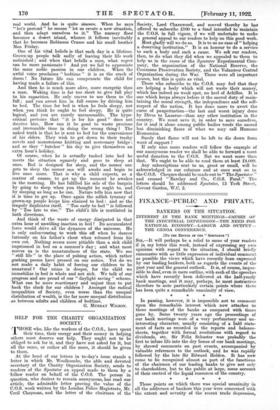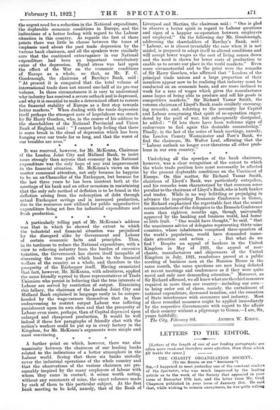FINANCE—PUBLIC AND PRIVATE.
BANKERS ON THE SITUATION.
INTEREST IN THE BANK MEETINGS—CAUSES OF THE INDUSTRIAL DEPRESSION—TICE NEED FOB NATIONAL ECONOMY—LABOUR AND 0 UTPUT — THE GENOA CONFERENCE.
.LT0 THE Eximolt or TRE " SPICTATOR."] SIB,—It will perhaps be a relief to sonic'ef your readers if in my letter this week, instead of expressing my own opinions with regard to the situation, should briefly summarise with as little expression of individual -comment as possible the views which have recently been expressec1 by our leading bankers, both as regards the events of the past year and the general outlook. It is, of -course, impos- sible to deal, even in mere outline, with each of the speeches which have ,recently been delivered [at the lialf-yearly bank meetings, and it may, perhaps, be most inetructime therefore to note particularly certain points where there has been quite a remarkable unanimity of view.
In passing, however, it is impossible not to comment upon the remarkable interest which now attaches to these meetings of the banks as compared with times gone -by. Some twenty years ago the proceedings of our bank meetings were of a very perfunctory and
mm- interesting character, usually consisting of a bald state- ment of facts as recorded in the reports and balance- sheets, together with formal resolutions with regard to dividends, etc. Sir Felix Schuster was probably the first to infuse life-into the dry bones of our bank meetings, by shrewd comments on past events, accompanied by valuable references to the outlook, and he was rapidly followed by the late Sir Edward Holden. It has now come to be recognized almost as part of the functions of the chairmen of our leading banks to give not only to shareholders, but to the public at large, some account of their control of the liquid resources of the -country.
Those points on which there was special unanimity in all the addresses of bankers this year were concerned with the extent and severity of the recent trade depression. the urgent need for a reduction in the National expenditure, the deplorable economic conditions in Europe, and the indications of a better feeling with regard to the Labour situation in this country. As regards the first of these ,points there was little to choose between the tones of eraphasia used about the past trade depression by the various bank chairmen, and all the speakers were similarly ,sure that the continued extravagance in our National .expenditure had been an important contributory cause of the depression. Equal stress was laid upon the effect of the War on the economic conditions of Europe as a whole, so that, as Mr. F. C. Goodenough, the chairman of Barclays Bank, said : "Al present it is computed that the total volume of • international trade does not exceed one-half of its pre-war volume. In these circumstances it is easy to understand -why industry has received a severe setback and is depressed, and why it is essential to make a determined effort to restore the financial stability of Europe as a first step towards better markets." When dealing with the trade depression itself perhaps the strongest note of hopefulness was struck by Sir Harry Goschen, who, in the course of his address to the shareholders of the National Provincial and Union Bank of England, said : "I cannot help feeling that there is some break in the cloud of depression which has been hanging over our trade for so long, and that the worst of our troubles are over."
It was reserved, however, for Mr. McKenna, Chairman of the London Joint City and Midland Bank, to insist more strongly than anyone that economy in the National expenditure was the only hope of any real improvement in the financial situation. Mr. McKenna's views on this matter command attention, not only because he happens to be an ex-Chancellor of the Exchequer, bat because for the last three years he has been insistent both at the meetings of his bank and on other occasions in maintaining that the only safe method of deflation is to be found in the deflation arising from the redemption of debt through actual Exchequer savings and in increased production, due to the resources now utilized for public unproductive expenditure being set free for industrial expenditure and fresh production.
A particularly telling part of Mr. McKenna's address was that in which he showed the extent to which the industrial and financial situation was prejudiced by the disregard alike by Government and Labour of certain economic facts and principles. Thus, in: its tardiness to reduce the National expenditure, with a view to relieving industry from the burden of excessive taxation, the Government has shown itself incapable of discerning the true path which leads to the financial welfare of the country as a whole, and therefore to the peosperity of the Exchequer itself. Having enunciated that fact, however, Mr. McKenna, with adroitness, applied the same friendly reproof to those representatives of Trade Unionism who persist in believing that the true interests of Labour are served by restriction of output. Examining this fallacy, the chairman of the London Joint City and Midland Bank explained in language easily to be compre- hended by the wage-earners themselves that in thus endeavouring to restrict output Labour was infficting punishment upon its own class and that the prosperity of Labour even more, perhaps, than of Capital depended upon enlarged and cheapened production. It would be well indeed if these few paragraphs of friendly chat with the nation's workers could be put up in every factory in the Kingdom, for Mr. McKenna's arguments were simple and most convincing.
A further point on which, however, there was also unanimity between the chairmen of our- leading banks related to the indications of a better atmosphere in the Labour world. Seeing that these six banks unitedly cover the industrial operations of the whole country and that the observations of the various chairmen are pre- sumably •inspired -by the many employers of labour with whom they come in contact, it seems worth noting, without• any comments of mine, the exact reference made by each of them to this particular subject. At the first ,bank meeting to be held, namely, that of the Bank of Liverpool and Martins, the chairman said : "Chic is glad to observe a better spirit in regard to Labour questions and signs of a happier co-operation between employers and employed." On the following day Mr. Goodenough, addressing the shareholders of R.arclay's Bank, said : "Labour, as is almost invariably the case when it is not misled, is prepared to adapt itself to altered conditions and will accept lower wages as the cost of living comes down and the need is shown for lower costs of production to enable us to secure our place in the world markets." Even more circumstantial and to the point were the remarks of Sir Harry Goschen, who affirmed that "Leaders of the principal trade unions and a large proportion of their members appear now to be realising that industry must be conducted on an economic basis, and are more inclined to work for a rate of wages which gives the manufacturer some hopes. of being able to produce and sell his goods in competitive markets." Sir Richard Vassar Smith, the veteran chairman of Lloyd's Bank, made similarly encourag- ing remarks, and, referring to the necessity for Capital and Labour recapturing that spirit of co-operation engen- dered by the peril of war, but subsequently dissipated, he added : "Of late there have been welcome signs of endeavours to find again this desirable comradeship." Finally, in the last of the series of bank meetings, namely, the London County Westminster and Parr's Bank, we find the chairman, Mr. Walter Leaf, affirming that the "Labour outlook no longer over-threatens all other prob- lems in our own country."
Underlying all the speeches of the bank chairmen, however, was a, clear recognition of the extent to which the whole trade position here must necessarily be affected by the present deplorable conditions on the Continent of Europe. On this matter, Sir Richard Vassar Smith, chairman of Lloyd's Bank, was particularly outspoken, and his remarks were characterised by that common sense peculiar to the chairman of Lloyd's Bank,who is both banker and trader. While in no way belittling or prejudging in advance the impending Economic Conference in Genoa, Sir Richard emphasized the regrettable fact that the sound recommendations of the delegates to the Brussels Conference more than eighteen months ago, though universally approved by the banking and business world, had borne so little fruit. "One would have thought," he said, "that the unanimous advice of delegates representing thirty-nine countries, whose inhabitants comprised three-quarters of the world's population, would have demanded imme- diate attention and action . . . But what do we find ? Despite an appeal of bankers in the United Kingdom in May of 1921, the appeal of mer- chants, manufacturers and shipowners of the United Kingdom in July, 1921, resolutions passed at a public meeting of business men at the Mansion House in the same month, the same questions are now being debated at recent meetings and conferences as if they were quite novel and only now demanding attention." Moreover, as Sir Richard affirmed, we all know what are the chief measures required in more than one country—including our own— to bring order out of chaos, namely, the curtailment of national expenditure, decreased taxation, and the cessation of State interference with commerce and industry. Most of these remedial measures might be applied immediately by the respective Governments with regard to the affairs of their country without a pilgrimage to Genoa.—I am, Sir, yours faithfully,



































 Previous page
Previous page